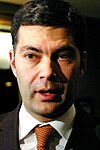Quebec general election, 2008
|
|
|||||||||||||||||||||||||||||||||||||||||||||||||||||||||||||||||||||||||||||||||||||||||||
|
|||||||||||||||||||||||||||||||||||||||||||||||||||||||||||||||||||||||||||||||||||||||||||
|
|||||||||||||||||||||||||||||||||||||||||||||||||||||||||||||||||||||||||||||||||||||||||||
|
|
|||||||||||||||||||||||||||||||||||||||||||||||||||||||||||||||||||||||||||||||||||||||||||
|
|||||||||||||||||||||||||||||||||||||||||||||||||||||||||||||||||||||||||||||||||||||||||||
Jean Charest
Quebec Liberal Party
Jean Charest
Quebec Liberal Party
The Quebec general election of 2008 was held in the Canadian province of Quebec on December 8, 2008. Jean Charest was elected for his third mandate and formed a majority government. This was the first time since the 1950s (when the Union Nationale of Maurice Duplessis won four consecutive elections) that a party or leader was elected to a third consecutive mandate, and the first time for the Liberals since the 1930s, when Louis-Alexandre Taschereau was premier.
The 2008 election also marked the first time that Québec solidaire won a seat.
Charest called the election on November 5, saying he needed a "clear mandate" and a majority to handle the economic storm. He was criticized, however, by the Parti Québécois and the Action démocratique du Québec for calling a snap election to get a majority when they were willing to work with him to fix the economy.
Most notably, the election was marked by a significant collapse in support for the ADQ. Formerly a relatively minor party, the ADQ had attracted significant protest support in the 2007 election, beating the Parti Québécois to Official Opposition status. In 2008, however, the party's support dropped back to approximately 15 per cent of the popular vote, roughly the same range of support the party attracted before 2007. As a result of this loss of support, Mario Dumont announced in his concession speech that he would step down as party leader.
...
Wikipedia





